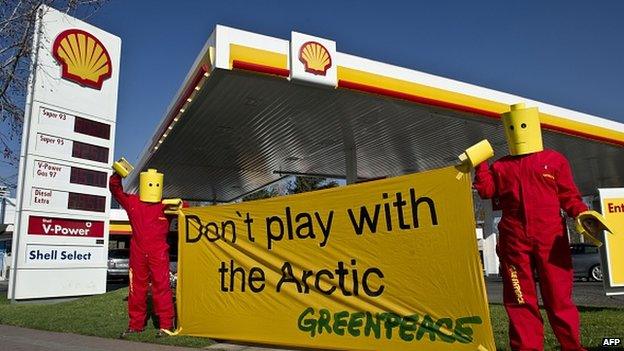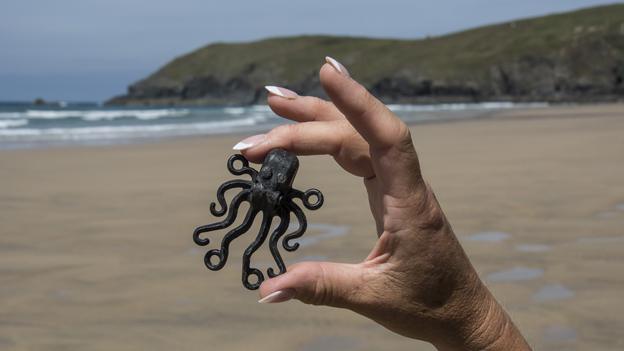Lego 'won't renew' contract with Shell after Greenpeace campaign
- Published

Greenpeace protesters are protesting Lego's promotional ties to Shell, which is looking to drill for oil in the Arctic
Danish toymaker Lego will not renew a promotional contract with Royal Dutch Shell following pressure from environmental group Greenpeace.
But Lego did not say when its "long-term" contact with Shell expires.
Greenpeace has been campaigning against Arctic drilling by oil companies such as Shell and has accused Lego of associating with "bad company".
Lego toys are handed out to people filling up at Shell gas stations in more than 30 countries.
As part of a branding deal first signed in 2011, Lego has also sold toy brick sets in the shape of petrol stations and drilling rigs with Shell's logos on them.
Greenpeace said Shell has been using Lego to build brand loyalty with millions of children who are the "next generation of consumers".
As part of its campaign, the lobby group uploaded a Youtube video showing Lego toys drowning in oil in the Arctic, which received nearly six million hits.
"It should choose its partners more carefully when it comes to the threats facing our children from climate change," Greenpeace said in response to Lego's decision., external
Environmental dispute
Lego Group president and chief executive Jorgen Vig Knudstorp said the company should never have become part of Greenpeace's dispute with Shell.
"The Greenpeace campaign uses the Lego brand to target Shell," he said in a statement., external "We firmly believe Greenpeace ought to have a direct conversation with Shell."
"We do not agree with the tactics used by Greenpeace that may have created misunderstandings among our stakeholders about the way we operate," he added.
Shell said its contract with Lego "has been a great success and will continue to be as we roll it out in more countries across the world".
Shell has been exploring for oil in the Arctic since 1918 and is forecast to spend billions of dollars drilling for oil and other fossil fuels in the Arctic over the next decade.
In recent years, the practice has come under intense scrutiny because of concerns it will damage the environment and contribute to global warming.
"The extreme Arctic conditions, including giant floating icebergs and stormy seas, make offshore drilling extremely risky," Greenpeace said.
"Scientists say that in the Arctic, an oil spill would be impossible to clean up meaning devastation for the Arctic's unique wildlife."
- Published22 September 2014

- Published6 August 2014

- Published21 July 2014
